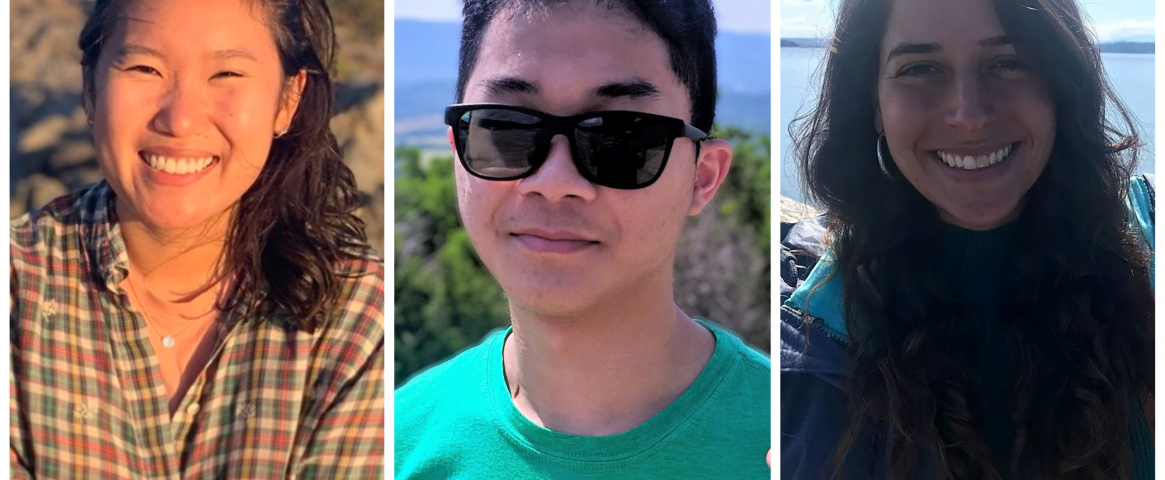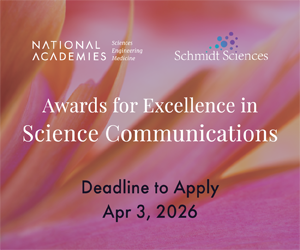Earlier this year, NASW members Delger Erdenesanaa, Alex Ip, and Claudia López Lloreda, were awarded Diversity Summer Fellowships to help offset the costs associated with pursuing science communication internships over the summer.
The $5,000 fellowships are awarded by NASW’s Diversity Committee each year to support underrepresented minorities pursuing an internship in any medium. Awardees also receive a one-year complimentary membership to NASW.
Erdenesanaa (@_e_delger), a student in NYU’s Science Health & Environmental Reporting Program, interned at Inside Climate News as part of a new program focused on environmental justice reporting. Erdenesanaa published stories on topics like the environmental issues at stake in local elections, the role of organized labor in the clean energy transition, changes in cities’ transportation options during the coronavirus pandemic, and the unequal burden of the urban heat island effect.
“Receiving the NASW Diversity Summer Fellowship helped me take full advantage of an internship opportunity at Inside Climate News without worrying about how to make ends meet over the summer,” Erdenesanaa said. “Using my fellowship funding to live in New York over the summer meant I could meet many of my colleagues in person and receive ongoing guidance from some of the best in the climate journalism business. Being in such a big city meant I was able to connect with a wide range of scientists and people in the community, and find story ideas that I wouldn’t have otherwise. Thanks to the fellowship, I’ll also be able to graduate from my master’s program in science reporting this winter with a little less financial worry, and consider my career options a little more freely.”
She added: “There’s still a need for more people of color, more immigrants and more low-income people in the world of science communication (as well as a need for many other kinds of diversity), but I’m encouraged by all the young writers coming up with me, and by initiatives like the NASW fellowship. I look forward to paying it forward in the future.”
Ip (@AlexIp718) spent the summer as a communications/science writing intern at Smart Sea Level Sensors, a multi-agency project in Georgia that aims to collect real-time data on coastal flooding for emergency planning and response.
Ip visited Savannah, Ga, twice during the internship, with support from the Institute for Journalism and Natural Resources Southeastern Oceans + Climate reporting grant. His coverage includes stories about the work being done in this collaborative project and data-driven solutions to assess hazards during flooding and sea level rise.
“I also continued my editing work with The Xylom, the nonprofit I founded that creates personal stories of science and humanity,” Ip said. “Much of The Xylom’s storytelling in the summer focused on working with historically marginalized groups, and I have increasingly got comfortable with doing data visualizations using Flourish.studio to add new angles to their stories.”
Statistics that Ip highlighted include:
- The U.S. handed out 70% fewer visas to international students in 2020 compared to the previous year.
- Since data has been made available, on average, two Black women earn a Physics Ph.D. every year.
- Morocco and Tunisia are the only two African Countries to have over 20% of their population receive a COVID-19 vaccine.
“By providing space for diverse science storytelling, we could turn these stunning data points into narratives with nuance. I was fortunate to receive the Fellowship from NASW, so I gave back to the people who have put their trust and stories in me by doubling honoraria for everyone who writes or translates work for The Xylom,” Ip said.
In August, Ip used some of the fellowship funds to embark on an Amtrak trip across 17 states, where he met with science writers Krishna Sharma and Madeline Canmann and visited scientific institutions such as the National Museum of American History, the Field Museum, Northwestern University, Harvard, MIT, Penn, and the Science History Institute in Philadelphia.
“I took many photos of these locations for The Xylom’s illustrations and I intend to release some of them royalty-free so that science communicators and everyone else can use them,” Ip said.
López Lloreda (@claulopezneuro), a neuroscience PhD student at the University of Pennsylvania and a AAAS Mass Media Fellow, interned at STAT for 10 weeks as a reporter covering science and healthcare.
During that time, she wrote 13 stories, including a Q&A, coverage of a STAT conference, newsletter items for the Morning Rounds Newsletter, short news stories, and longer enterprise features, including this piece on the inability to visit loved ones in hospital during the pandemic.
“I was able to explore different types of stories while at the same time being a productive member of the team,” López Lloreda said. “In these stories, I contributed to diversity by highlighting issues that impact vulnerable communities. I also tried to do my best to consider and include diverse voices from women and BIPOC individuals. Many times, these individuals brought up issues and perspectives that no other source had brought up, such as the lack of diversity in clinical trials.”
López Lloreda added: “Thanks to the NASW Diversity Fellowship, I was able to visit and work in person in the Boston offices for two weeks. During my visit to Boston, I had the chance to see and work in the STAT offices, go to lunch, and get coffee with other editors and reporters. I learned so much just by being in the office and listening to other reporters conduct interviews and brainstorm ideas with others. This wouldn’t have been possible without the NASW funding I received. The internship helped me solidify my career interests: I now know that I want to continue in a career in science journalism. It also helped me identify what type of science journalism I want to pursue.”



